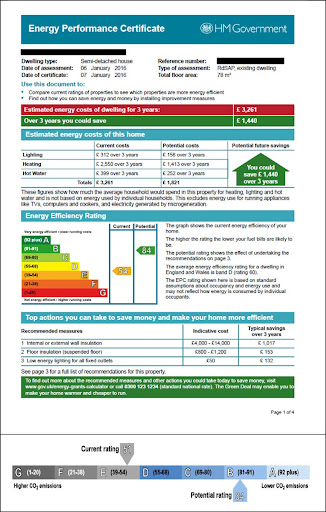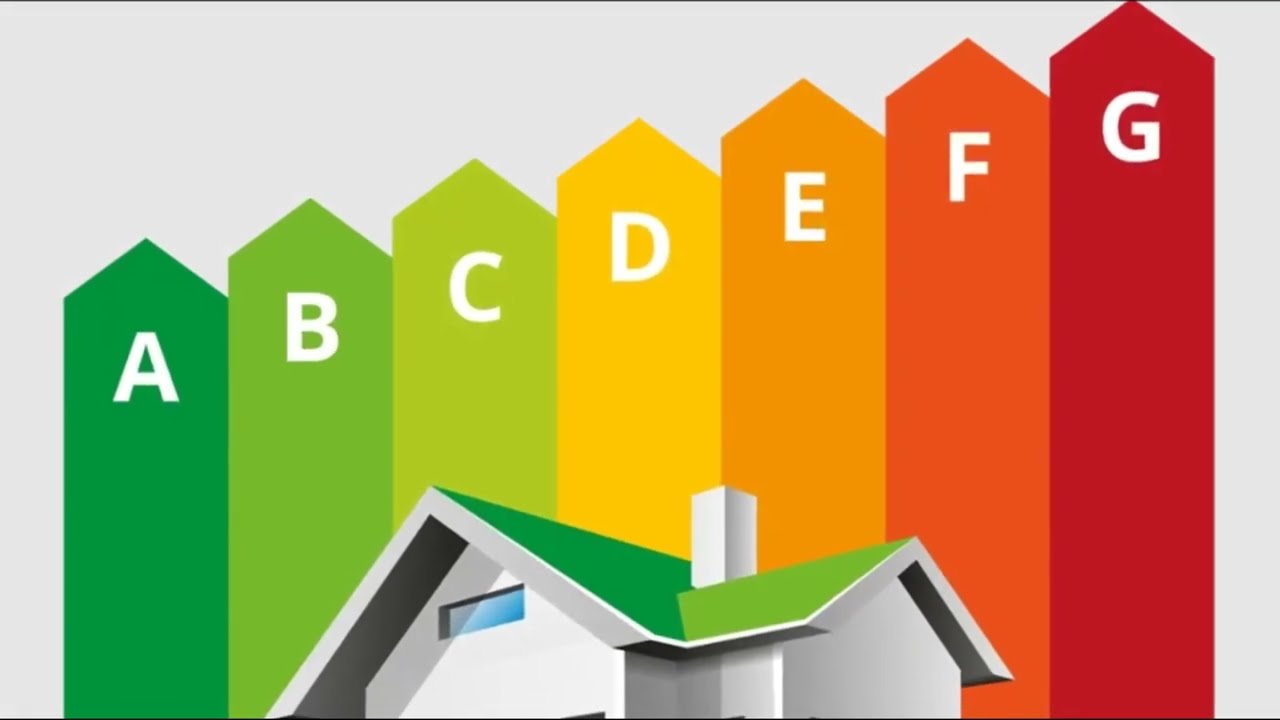Table of Contents
Every UK homeowner or landlord requires a valid EPC (Energy Performance Certificate) in order to sell or rent his/her property. Without this certificate, nobody can apply for the government heating grants despite meeting all the requirements.
EPC ratings are the backbone for UK homes. They show how energy-efficient a property is. That is why every owner should know how the EPC rating system operates and how to enhance cost savings with respect to energy expenses and lesser emission of greenhouse gases. Before we go into more detail on this important subject; let us first establish what it means.
What Exactly EPC Rating Mean?
An EPC rating stands for Energy Performance Certificate. It shows how much energy a home uses. They have a big impact on the property market and affect how buyers and renters view homes. EPC ratings are used by homeowners to identify areas where they may improve energy savings.
Properties are categorised by letters ranging from A to G. The rate at which a home consumes energy is determined using an EPC rating. UK homeowners or landlords should know how much energy their homes consume. EPC ratings are important in the UK housing market. They can affect home values and are vital for rental decisions.
Why Do They Matter?
EPC ratings are needed for selling or renting homes in the UK. They help buyers and renters see how energy-efficient a home is. Properties with better ratings are cheaper to heat and run, making them more attractive. An EPC measures a home’s energy use and carbon emissions. It also gives tips to reduce energy costs.
Homes with good EPC ratings are worth more. Buyers know they will save on energy bills. Moreover, the UK government offers grants for homes having low-EPC. These free grants can reduce the cost of home heating improvements to give a boost to the EPC.
What’s Included in an EPC Certificate?
Usually the whole property’s information that pertains to energy saving on heating is tagged with an EPC certificate. This enables households to know which rooms need more heating so that they can minimise energy bills. What is contained in an EPC are like:
- Dwelling Type: The category of which the home it represents, including detached homes, semi-detached dwellings, terraced buildings and flats. Considering the structure and the way they are conditioned with respect to the outside, the energy efficiency potentials are different for each type.
- Date of Assessment: The date when the energy assessment was conducted. This is important as energy standards and home features may change over time.
- Date of Certificate: This shows when the EPC certificate was issued. It is valid for 10 years according to that date.
- Assessment Type: This tells you whether the assessment was based on an actual visit or standard estimates for similar properties.
- Total Floor Area: The certificate shows the total floor area of the property in square metres. Larger homes may need more energy to heat and run.
- Estimated Energy Cost for the Past 3 Years: The document estimates the cost for energy over the last three years. This is useful for prospective buyers and tenants who want to know how much it costs for heating etc.
- Estimated Savings Over Three Years: Some homeowners may also see how much they would have saved over the next three years if they implemented the recommended energy solutions presented in their EPC report.
- Detailed Energy Cost Breakdown: The energy costs on the EPC are broken down to show you understand how much you spend on heating or hot water. By doing so, they will be able to identify what consumes the most energy in their homes while also knowing where they could save more.
- Energy Efficiency Rating Chart: This is the output as a percentage of input energy will be if the current rating is improved. Knowing how their property performs is enabled for instance by homeowners by checking their present-day score, while one can also see “how much better” it becomes.
- Top Actions for Improvement: The EPC lists the top actions homeowners can take to improve their energy efficiency. These include insulating the loft, replacing old boilers or light bulbs with energy-saving LED ones and so forth.
- CO2 Emissions Bar: At the most bottom, the certificate includes a bar that shows the home’s current carbon dioxide (CO2) emissions rating. It also shows the potential reduction in emissions if the homeowner follows the recommended improvements

Legal Requirements
EPC ratings are required by law in the UK. They are important for landlords, sellers, and property managers.
1. Mandatory EPC for Rental Properties
Before a landowner can lease their property, they should have a valid EPC in place, it is illegal to let a house without one. To rent out a house, the minimum rating needed is an E; otherwise, it would not be possible unless exempted under specific circumstances. Failure to comply with this requirement would impose penalties.
2. Requirements for Home Sellers
When an individual puts up his/her property for sale, he/she must also present an EPC upon request by the prospective buyer(s). The first thing that needs to be done is offering an energy performance certificate (EPC) ready for potential customers (or even before). The EPC enables buyers to determine how much energy a building consumes and this consequently affects whether they want it or not.
3. Regulations and Compliance
Concerning domestic issues, including heating and lighting systems, the EPC direction is part of the government’s strategy on reducing residential energy consumption. Properties that fail to meet certain energy efficiency requirements may receive some fines/lawsuits. Compliance is essential for anyone selling or renting out a property, as fines for non-compliance can reach up to £5,000.
Meeting these legal requirements ensures that properties are energy efficient and environmentally friendly.
How EPC Ratings Are Calculated
An EPC rating is calculated through a property assessment. An energy assessor visits the property to check various factors. EPC ratings are determined through a detailed assessment of a property’s energy efficiency. Here’s how it works:
Overview of Assessment Process
A property’s energy rating can be enhanced when an approved energy assessor conducts an energy audit which involves examining structural aspects of the building, heating systems, insulation installation effectiveness and other elements that contribute to energy consumption. This procedure entails collecting data and assigning an EPC rating between A and G with ‘A’ being the highest.
Factors Influencing the Rating
Several factors impact the EPC rating. The assessor looks at:
- The type of insulation installed
- The heating system’s efficiency
- The presence of energy-efficient technologies like double glazing or LED lighting
The age and condition of the property - The fuel used for heating (e.g., gas, electric, oil)
1. Insulation
On EPC ratings insulation matters a lot- good insulation on walls, roofs or floors helps reduce heat loss in a home. Therefore, homes with properly insulated areas attract high EPC ratings as they are more likely to keep warm air inside; hence low energy consumption.
2. Heating Systems
Energy efficient heating systems may lead to higher EPC ratings for buildings. Modern boilers, under floor heating and smart thermostats are some of the ways through which energy use can be reduced. However, if one has an old-fashioned boiler then his or her home will have poor energy performance and result in lower EPC scores.
3. Energy-Efficient Technologies
Better performing homes when it comes to energy tend to have higher EPC ratings. Having double glazed windows, LED lights and other efficient systems like solar panels will result in improved scores due to overall rating methodology for energy performance.
Improving these areas can lead to a significant increase in a property’s EPC rating, reducing energy costs and improving comfort.
Improving Your EPC Rating
Upgrade Your Boiler Today!
Boosting your EPC rating can reduce energy bills, make your home more comfortable, and increase its market value. Here are some effective ways to improve your EPC rating:
1. Common Strategies for Improvement
Your home’s energy efficiency can greatly improve with some easy steps. Some major things to do include upgrading insulation, buying new appliances and trying out solar energy. A better EPC rating comes as a result of these changes and in addition it can save one’s money.
2. Insulation Upgrades
One of the most effective ways of boosting EPC rating is through enhancing insulation. In this case adding or upgrading insulation at areas such as lofts, walls, and floors helps in retaining heat, while making sure that only minimal amounts are wasted. Meaning less energy is used to keep homes warm when winter is with us due to proper insulation because no heat is lost during the process.
3. Energy-Efficient Appliances
Replacing old appliances with new energy efficient ones is a great way to increase a home’s EPC rating. New appliances, like washing machines, refrigerators, and dishwashers, consume less electricity and are sometimes more friendly to the environment. This decrease will in general reduce your entire energy consumption and bills too.
4. Renewable Energy Options
You can raise your energy performance certificate (EPC) considerably if only you installed green energy systems such as solar panels or heat pumps. The sources of renewable energy include solar and wind energy, as well as biofuels derived from ocean waves or plant materials among others; hence avoiding fossil fuels consumption that lead to greenhouse gas emissions while at the same time ensuring that your property uses less energy.
In spite of the initial cost being high; these investments are worthwhile because they attract government subsidies in addition to helping people save money over time through low-interest loans on top of low monthly bills on lighting needs.
Moreover, people who live in homes should do this so that they may benefit from lower bills on energy consumption besides reducing their household outlet’s emission level thus attracting tenants who prefer renting homes having high EPC ratings.
Consequences of Low EPC Ratings
A low EPC rating can have negative effects on a property’s value and rental options.
Potential Penalties for Landlords: Landlords with properties rated below E can face fines. This is because homes must meet minimum EPC standards.
Limitations on Property Sale/Rental: Homes with low EPC ratings are harder to sell or rent. Buyers and renters prefer energy-efficient homes. Low-rated properties may sit on the market longer.
Environmental Implications: Homes with poor EPC ratings contribute to environmental problems. They use more energy and produce higher carbon emissions, harming the planet.
Conclusion
EPC ratings are important for property owners and renters. Property value, energy costs and environmental impact are influenced by them. A person can save money and make their home more attractive by improving their EPC rating. If you care about the environment, ensure your rented or owned home is more energy-efficient.
Frequently Asked Questions
An Energy Performance Certificate is valid for 10 years. If your certificate is expired, you should get a new EPC for selling or renting out your property before the end of the validity.
In the UK, it is strictly prohibited to sell or rent your home without having a valid EPC. Every homeowner or landlord is legally required to assess his/her property to identify its EPC rating.
Typically the EPC assessment cost ranges from £50 to £120, depending on the size and location of your property.
Of course, an EPC includes the top areas that are most liable for giving high energy bills. Also it suggests some upgrades that can possibly reduce some amount of carbon emission from your property.



